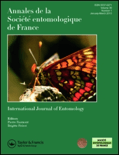
ANNALES DE LA SOCIETE ENTOMOLOGIQUE DE FRANCE
Scope & Guideline
Connecting researchers to the dynamic realm of insects.
Introduction
Aims and Scopes
- Taxonomy and Systematics:
The journal frequently publishes comprehensive taxonomic revisions and descriptions of new species across various insect orders, including Coleoptera, Hymenoptera, and Orthoptera, showcasing the importance of accurate classification in entomological research. - Ecology and Biogeography:
Research articles often explore ecological dynamics and biogeographical patterns of insect populations, highlighting their seasonal abundance, phenology, and host-plant associations, which are crucial for understanding insect roles in ecosystems. - Conservation and Biodiversity:
The journal addresses conservation issues related to insect species, including assessments of population sizes and conservation statuses, which are vital for informing biodiversity preservation efforts. - Integrative Approaches:
There is a consistent use of integrative methodologies, combining morphological and molecular techniques to resolve taxonomic ambiguities and uncover hidden diversity within insect taxa. - Paleontology and Historical Biogeography:
The journal includes studies on fossilized insects and their implications for understanding historical biogeography, contributing to the broader narrative of insect evolution.
Trending and Emerging
- Molecular Taxonomy and Phylogenetics:
There is an increasing emphasis on molecular techniques to resolve taxonomic issues and elucidate phylogenetic relationships among insect species. This trend underscores the importance of genetic data in contemporary taxonomy. - Ecological Interactions and Host-Plant Relationships:
Research focusing on the interactions between insects and their environment, particularly their relationships with host plants, has gained significant traction. This reflects a growing awareness of the ecological roles insects play and their responses to environmental changes. - Conservation Biology and Endangered Species:
Studies assessing the conservation status of endangered insect species are becoming more prevalent, highlighting a shift towards applied research aimed at biodiversity preservation and management. - Historical Biogeography and Fossil Studies:
There is a renewed interest in the historical biogeography of insects, with studies on fossilized species contributing to our understanding of evolutionary processes and past ecological dynamics. - Behavioral Ecology and Insect Communication:
Emerging themes include research on the behavioral ecology of insects, particularly in relation to mating behaviors and communication strategies, reflecting a growing interest in understanding the complexities of insect behavior.
Declining or Waning
- Traditional Morphological Studies:
There has been a noticeable decrease in purely morphological studies without modern integrative approaches. This reflects a broader trend in entomological research towards molecular techniques that provide more robust insights into taxonomy and phylogeny. - General Faunistic Surveys:
While biodiversity assessments remain important, general faunistic surveys that do not focus on specific ecological or conservation implications are less frequently published, indicating a shift towards more targeted research. - Invasive Species Research:
Although still relevant, the frequency of studies solely dedicated to invasive species has diminished, possibly due to a growing focus on the ecological impacts and management strategies rather than mere documentation.
Similar Journals

ACTA ENTOMOLOGICA MUSEI NATIONALIS PRAGAE
Pioneering Insights into Insect Behavior and SystematicsACTA ENTOMOLOGICA MUSEI NATIONALIS PRAGAE, published by the esteemed NARODNI MUZEUM - PRIRODOVECKE MUZEUM in the Czech Republic, is an influential journal in the fields of Ecology, Evolution, Behavior and Systematics, as well as Insect Science. With an ISSN of 0374-1036 and an E-ISSN of 1804-6487, this journal has established itself as a vital resource for researchers, professionals, and students interested in the intricate world of entomology. Spanning publications from 2005 to 2024, it is recognized for its contributions to the understanding of insect biology, offering insights on ecological interactions and evolutionary relationships. Although it operates as a subscription-based platform, the journal maintains a respectable presence in scholarly circles, positioned in the Q2 quartile for both relevant categories in 2023. ACTA ENTOMOLOGICA serves not only as a repository of significant empirical findings but also as a discourse platform for emerging entomological concepts, making it an essential read for those involved in the biological sciences.
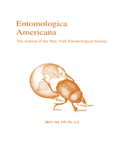
Entomologica Americana
Exploring the Intricacies of Insect LifeEntomologica Americana is a pivotal journal in the field of Insect Science, published by the esteemed New York Entomological Society Inc. With its ISSN (1947-5136) and E-ISSN (1947-5144), this journal serves as a critical resource for researchers, professionals, and students dedicated to the study of entomology. Although it is categorized in the Q4 quartile for Insect Science as per the 2023 Scopus Rankings, where it ranks 179 out of 181, it continues to provide valuable insights into various aspects of insect biology, ecology, and conservation. The journal has been actively publishing since its convergence years from 2009 to 2017, and in selected years thereafter, including 2019, 2021, and 2023. Located at the iconic American Museum of Natural History in New York City, Entomologica Americana is a testament to the ongoing exploration and understanding of the insect world that underpins biodiversity and ecosystem health. Although it does not operate under an Open Access model, it offers a vital platform for scholarly communication and the dissemination of research findings, making it indispensable for anyone involved in or entering the fascinating field of entomology.
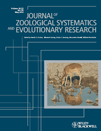
JOURNAL OF ZOOLOGICAL SYSTEMATICS AND EVOLUTIONARY RESEARCH
Transforming Insights into Evolutionary UnderstandingThe Journal of Zoological Systematics and Evolutionary Research, published by Wiley-Hindawi, stands as a premier academic journal since its establishment, showcasing cutting-edge research in the fields of Animal Science, Zoology, and Ecology. With an impressive track record spanning from 1963 to the present, this journal has earned a Q1 classification in both Animal Science and Ecology, as well as recognized rankings in Genetics and Molecular Biology. Its impact is highlighted by its Scopus ranks, placing it in the top percentile for relevant categories, underscoring its vital role in advancing knowledge and understanding within these disciplines. Researchers, professionals, and students will find a wealth of high-quality, peer-reviewed articles that contribute to the evolutionary understanding of biodiversity and systematics. Though not an Open Access journal, it remains accessible to a wide audience committed to exploring the intricacies of zoology and evolutionary biology.
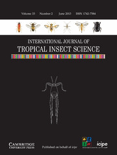
INTERNATIONAL JOURNAL OF TROPICAL INSECT SCIENCE
Fostering Dialogue in Insect Biology and EcologyINTERNATIONAL JOURNAL OF TROPICAL INSECT SCIENCE, published by Springer International Publishing AG, is a leading interdisciplinary journal dedicated to advancing knowledge in the fields of insect science and ecology. With its ISSN 1742-7584 and E-ISSN 1742-7592, this journal provides a platform for researchers to publish high-quality, peer-reviewed articles that explore various aspects of tropical insect biology, behavior, and their ecological impacts. As evidenced by its Q3 ranking in both Ecology, Evolution, Behavior and Systematics and Insect Science, it plays a vital role in fostering scientific dialogue and innovation within these disciplines. Researchers affiliated with the journal benefit from its visibility and growing impact, as demonstrated by its Scopus ranks, with a percentile standing of 61st in Insect Science. Although the journal is not open access, it still reaches a wide academic audience, making significant contributions to our understanding of tropical ecosystems. Situated in Switzerland, this journal is crucial for students, professionals, and researchers invested in the intersection of entomology and ecological science.
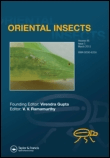
ORIENTAL INSECTS
Advancing Knowledge in Oriental Insect ScienceORIENTAL INSECTS is a distinguished journal dedicated to advancing the field of Insect Science, published by the reputable Taylor & Francis Ltd. With its long-standing history since 1967, this journal provides a platform for innovative research focused specifically on the diverse insect fauna of the Oriental region, encompassing topics such as taxonomy, ecology, physiology, and behavior. The journal is indexed with an ISSN of 0030-5316 and an E-ISSN of 2157-8745, making it easily accessible to a global audience. Although it currently does not operate under an Open Access model, its rigorous peer-review process ensures the dissemination of high-quality research. As a Q4 journal in the Insect Science category for 2023 and ranked 103 out of 181 in Scopus, ORIENTAL INSECTS remains a vital resource for researchers, professionals, and students seeking to enhance their understanding of insect biodiversity and conservation. Located in the United Kingdom, it is committed to promoting the latest scientific findings and fostering collaboration among entomologists worldwide, contributing significantly to the academic community.
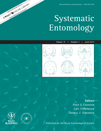
SYSTEMATIC ENTOMOLOGY
Unraveling the Mysteries of Insect SystematicsSYSTEMATIC ENTOMOLOGY is a premier journal published by Wiley, specializing in the field of entomology with a particular focus on insect systematics, ecology, evolution, and behavior. With its strong academic reputation, this journal has achieved a remarkable Q1 ranking in both Ecology, Evolution, Behavior and Systematics and Insect Science categories, affirming its influence and importance in advancing research in these critical areas. SYSTEMATIC ENTOMOLOGY has a broad scope, making it a valuable source for original research, reviews, and methodological advancements that contribute to the understanding of insect biodiversity and systematics. Operating from the United Kingdom, the journal is dedicated to fostering knowledge and innovation within the scientific community, ensuring that high-quality research is accessible to researchers, professionals, and students alike. The journal's consistent publication since 1976 and its continued relevance up to 2024 exemplify its commitment to the field and its readers.

Journal of Insect Biodiversity
Exploring the Intricacies of Insect LifeJournal of Insect Biodiversity, published by MAGNOLIA PRESS in New Zealand, offers a vital platform for researchers and professionals interested in the intricate world of insect science. Established in 2019, this journal covers a wide array of topics within its field, focusing on the ecological, evolutionary, and behavioral aspects of insects, while also engaging with paleontological perspectives. With an impressive Q2 and Q3 categorization in multiple ecological disciplines and a growing influence in the Scopus rankings, it serves as an essential resource for scholars aiming to deepen their understanding of insect diversity and its implications for ecosystems. The journal is committed to open access, promoting the dissemination of knowledge without barriers. Researchers, students, and professionals alike will benefit from the timely contributions this journal offers as it continues to reflect the dynamic and evolving nature of insect research up to the year 2024.

FRAGMENTA ENTOMOLOGICA
Illuminating the ecological roles of insects.FRAGMENTA ENTOMOLOGICA is a prominent peer-reviewed academic journal published by UNIV DEGLI STUDI DI ROMA LA SAPIENZA, focusing on various dimensions of entomology and insect science. With an ISSN of 0429-288X and an E-ISSN of 2284-4880, this journal has embraced an Open Access model since 2006, ensuring that valuable research is widely accessible to the global scientific community. Based in Italy, at the DIPARTIMENTO DI BIOLOGIA ANIMALE E DELL'UOMO in Rome, FRAGMENTA ENTOMOLOGICA is recognized for its commitment to high-quality research, ranking in the Q3 category across multiple categories, including Ecology and Insect Science, in 2023. Its Scopus rankings further underscore its relevance, showcasing its role in advancing knowledge in the fields of Ecology, Evolution, and Insect Behavior. This journal serves as an essential resource for researchers, professionals, and students interested in the intricate world of insects and their ecological roles, fostering academic discourse that bridges theoretical and practical entomological studies.

EUROPEAN JOURNAL OF ENTOMOLOGY
Showcasing European excellence in insect science.The European Journal of Entomology, published by the Czech Academy of Sciences, Institute of Entomology, is a pivotal journal in the field of Insect Science. With a solid impact factor and recognized ranking—placed in the Q2 quartile in 2023, and ranked #72 out of 181—this journal offers a platform for researchers and professionals alike to share insightful studies and advancements in entomological research. Since its inception in 1993, the journal has continuously evolved to cover a wide spectrum of entomological disciplines, establishing itself as an essential resource for academia and industry. Although it operates on a subscription basis, the journal ensures accessibility for a broad audience of scholars, students, and enthusiasts eager to stay at the forefront of entomological science. Located in Ceske Budejovice, Czech Republic, this journal not only highlights European contributions but also embraces global perspectives, making it an indispensable reference point in the ongoing exploration of insect biology and ecology.

REVISTA COLOMBIANA DE ENTOMOLOGIA
Empowering Entomologists with Groundbreaking ResearchREVISTA COLOMBIANA DE ENTOMOLOGIA, published by the SOC COLOMBIANA ENTOMOLOGIA-SOCOLEN, serves as a vital platform for disseminating research in the field of insect science. With an ISSN of 0120-0488, the journal has established itself as a key resource for entomologists, agricultural scientists, and biodiversity researchers, focusing on the ecology, taxonomy, and behavior of insects within the Colombian context and beyond. Despite its Q4 ranking in 2023, REVISTA COLOMBIANA DE ENTOMOLOGIA strives to enhance its impact within the academic community, offering a space for innovative studies and reviews that aim to advance the understanding of insect-related phenomena. As a publication addressing critical concerns in agricultural and biological sciences, it invites contributions that explore new methodologies and findings relevant to the insect world. Although it does not currently offer Open Access options, the journal's growth from 2004 to 2024 reflects its commitment to evolving with the needs of its readership and contributors, making it an essential reference point for students and professionals alike interested in entomological research.